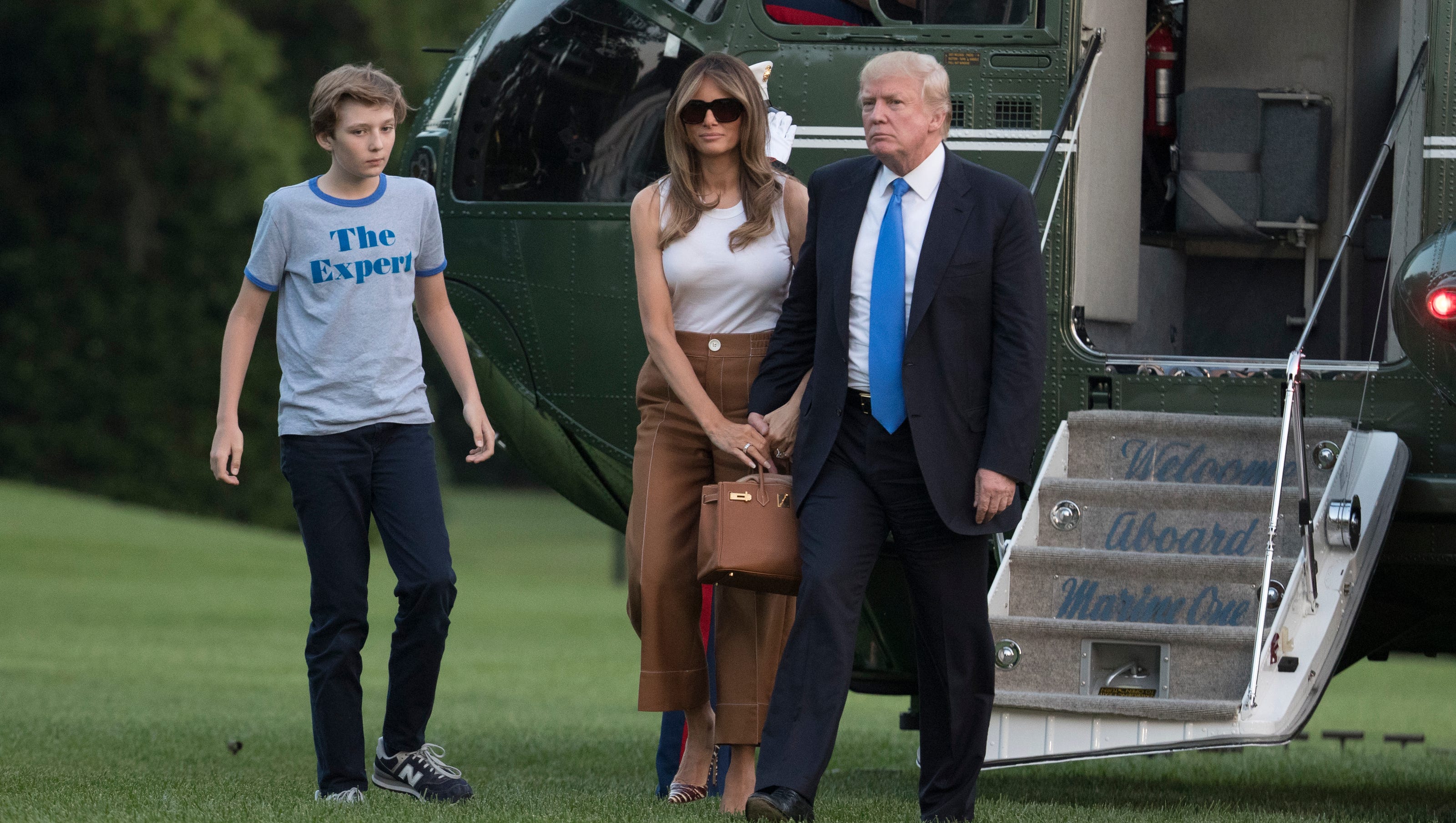Is Barron Trump autistic? This question has sparked widespread curiosity and debate, especially given the public's fascination with the Trump family. Barron Trump, the youngest child of former U.S. President Donald Trump and First Lady Melania Trump, has often been in the spotlight. Over the years, his behavior and demeanor in public appearances have led to speculation about his personality and potential neurodivergence. In this article, we will explore the origins of these rumors, analyze the available information, and provide clarity on the topic while adhering to ethical considerations.
Public figures, especially those in high-profile families, often face scrutiny that extends beyond their actions. Barron Trump, despite being a private individual, has been subject to numerous discussions online and in the media. Many of these discussions revolve around his reserved nature and unique characteristics, prompting questions about whether he might be on the autism spectrum. It is essential to approach this topic with sensitivity, as unfounded speculation can perpetuate stereotypes and misinformation.
In this article, we aim to provide a balanced and well-researched perspective on the question, "Is Barron Trump autistic?" We will delve into the facts, dispel myths, and emphasize the importance of respecting privacy and avoiding harmful assumptions. By the end of this article, readers will have a clearer understanding of the topic and the ethical implications of discussing neurodivergence in public figures.
Read also:G Baby Erome A Comprehensive Guide To Understanding And Embracing Modern Erotica
Table of Contents
- Biography of Barron Trump
- The Origins of Speculations
- Understanding Autism Spectrum Disorder
- Analyzing Barron Trump's Public Behavior
- The Role of Media in Shaping Perceptions
- Ethical Considerations in Discussing Neurodivergence
- The Trump Family's Perspective
- How to Support Individuals with Autism
- Conclusion
Biography of Barron Trump
Barron William Trump was born on March 20, 2006, in New York City. As the youngest child of Donald Trump and Melania Trump, he has grown up in the public eye, albeit with a relatively private upbringing compared to his siblings. Barron's early years were spent away from the intense media glare, but his life changed significantly when his father became the 45th President of the United States in 2017.
Below is a table summarizing Barron Trump's key personal details:
| Full Name | Barron William Trump |
|---|---|
| Date of Birth | March 20, 2006 |
| Place of Birth | New York City, New York, USA |
| Parents | Donald Trump (Father), Melania Trump (Mother) |
| Siblings | Donald Trump Jr., Ivanka Trump, Eric Trump, Tiffany Trump |
| Education | Private schooling; attended St. Andrew's Episcopal School |
Despite his family's prominence, Barron has maintained a low profile, rarely appearing in public or making statements. His reserved nature has contributed to the curiosity surrounding him, including questions about his personality and potential neurodivergence.
The Origins of Speculations
The question "Is Barron Trump autistic?" gained traction after a series of public appearances where Barron exhibited behaviors that some interpreted as signs of autism. For instance, during his father's inauguration in 2017, Barron stood quietly beside his parents, avoiding eye contact and appearing somewhat detached. These observations, combined with his limited public interactions, fueled discussions online and in the media.
Several factors have contributed to these speculations:
- Media Coverage: Barron's rare appearances and unique demeanor have been dissected by journalists and commentators, often leading to exaggerated interpretations.
- Social Media: Platforms like Twitter and Reddit have amplified discussions, with users sharing their opinions and theories about Barron's behavior.
- Lack of Information: The Trump family has chosen to keep Barron's personal life private, leaving room for speculation and conjecture.
It is important to note that these speculations are based on limited observations and should not be taken as evidence of any medical condition. Diagnosing someone without proper evaluation is both unethical and inaccurate.
Read also:Exploring Mydesinetcom A Comprehensive Guide To Understanding The Platform
Understanding Autism Spectrum Disorder
Before delving further into the topic, it is crucial to understand what autism spectrum disorder (ASD) entails. Autism is a neurodevelopmental condition characterized by differences in communication, social interaction, and behavior. Individuals with autism may exhibit a wide range of traits, which is why it is referred to as a "spectrum."
Common characteristics of autism include:
- Challenges with verbal and non-verbal communication.
- Difficulty with social interactions, such as maintaining eye contact or understanding social cues.
- Repetitive behaviors or intense focus on specific interests.
- Sensitivity to sensory stimuli, such as loud noises or bright lights.
Autism is diagnosed through comprehensive evaluations conducted by healthcare professionals. These evaluations consider various factors, including developmental history, behavioral patterns, and input from caregivers. It is essential to approach autism with empathy and understanding, recognizing that it is not a disorder to be "fixed" but a natural variation in human neurology.
Analyzing Barron Trump's Public Behavior
Barron Trump's public appearances have been relatively infrequent, but they have provided glimpses into his personality. Observers have noted his reserved demeanor, occasional lack of eye contact, and preference for standing quietly in group settings. While these behaviors might align with some traits associated with autism, they are not definitive indicators of the condition.
Several factors could explain Barron's behavior:
- Personality: Some individuals are naturally introverted or shy, which can manifest as reserved behavior in public.
- Age: As a teenager, Barron may still be navigating social situations and developing his communication skills.
- Environment: Growing up in a high-pressure environment like the White House could influence how he interacts with others.
It is important to avoid jumping to conclusions based solely on limited observations. Diagnosing autism requires a thorough understanding of an individual's developmental history and behavior, which is not possible through media portrayals alone.
The Role of Media in Shaping Perceptions
The media plays a significant role in shaping public perceptions of individuals, especially those in the public eye. In Barron Trump's case, media coverage has often focused on his unique characteristics, sometimes framing them in ways that fuel speculation about his neurodivergence.
Some examples of media influence include:
- Sensationalism: Headlines and articles that emphasize Barron's "mysterious" or "quiet" nature can perpetuate stereotypes about autism.
- Amplification of Rumors: Social media platforms often amplify unfounded claims, leading to widespread misinformation.
- Lack of Context: Limited information about Barron's life can result in oversimplified narratives that ignore the complexity of human behavior.
To combat these issues, media outlets should prioritize responsible reporting and avoid speculation about individuals' health or neurodivergence without credible evidence.
Ethical Considerations in Discussing Neurodivergence
Discussing neurodivergence, particularly in the context of public figures, requires careful consideration of ethical principles. Speculating about someone's medical condition without their consent can have harmful consequences, including perpetuating stigma and invading their privacy.
Key ethical considerations include:
- Respect for Privacy: Individuals, especially minors, deserve the right to keep their personal lives private.
- Avoiding Harm: Unfounded speculation can lead to misinformation and reinforce negative stereotypes about autism and other conditions.
- Promoting Understanding: Discussions about neurodivergence should aim to educate and foster empathy rather than sensationalize or stigmatize.
By adhering to these principles, we can create a more inclusive and respectful dialogue around neurodiversity.
The Trump Family's Perspective
The Trump family has largely refrained from addressing the rumors surrounding Barron's neurodivergence. In interviews, Melania Trump has described Barron as a "strong and independent" child, emphasizing his unique qualities and talents. However, she has not provided any specific information about his developmental or medical history.
This silence underscores the importance of respecting the family's decision to keep Barron's life private. Speculating about his condition without their input is not only disrespectful but also potentially harmful to Barron's well-being.
How to Support Individuals with Autism
Regardless of whether Barron Trump is autistic, it is essential to focus on supporting individuals with autism and their families. Autism awareness and acceptance can make a significant difference in improving the lives of those on the spectrum.
Here are some ways to support individuals with autism:
- Educate Yourself: Learn about autism to better understand the experiences of individuals on the spectrum.
- Advocate for Inclusion: Promote inclusive environments in schools, workplaces, and communities.
- Respect Differences: Recognize that neurodivergence is a natural variation and should be celebrated.
- Provide Resources: Support organizations that offer services and advocacy for individuals with autism.
By fostering a culture of acceptance and understanding, we can create a more inclusive society for everyone.
Conclusion
In conclusion, the question "Is Barron Trump autistic?" remains unanswered and should not be speculated upon without credible evidence. Barron Trump, like any individual, deserves respect and privacy, especially regarding his personal life and potential neurodivergence. This article has explored the origins of the rumors, provided an overview of autism spectrum disorder, and emphasized the importance of ethical considerations when discussing such topics.
We encourage readers to approach discussions about neurodivergence with empathy and understanding. Instead of focusing on unfounded speculation, let us work toward creating a more inclusive and supportive environment for individuals with autism and their families. If you found this article informative, please share it with others or leave a comment below to continue the conversation. Together, we can promote awareness and acceptance of neurodiversity in our communities.

